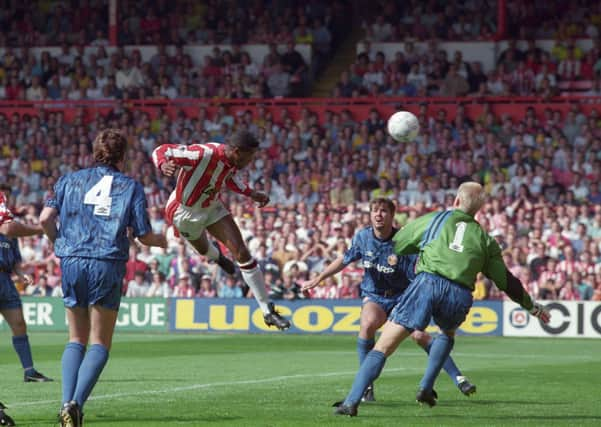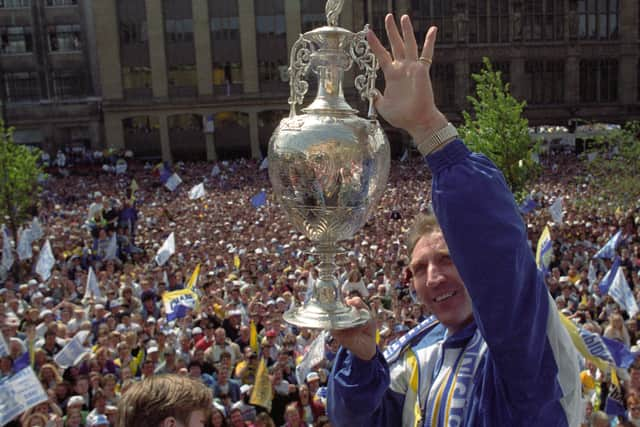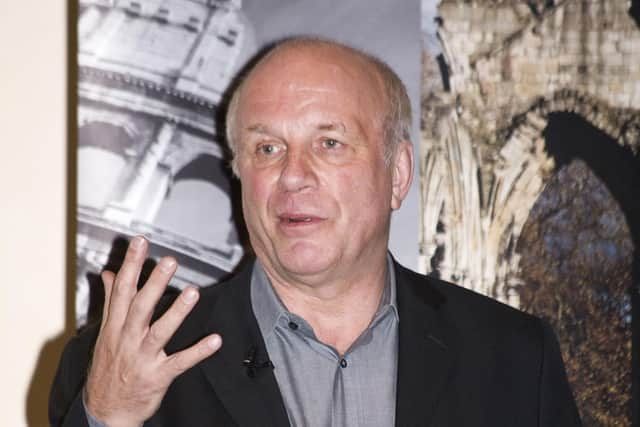How Premier League threatens devastation 28 years on from its birth


But whilst the history of our national sport did not begin with the Premier League, it changed it irrevocably. The consequences are arguably having more impact now, threatening more devastation in conjunction with the coronavirus, than at any time since May 27, 1992.
Just looking at the clubs who resigned from the Football League that day tells a story. Leeds United had just won the title with an English manager, two things that have not happened since.
Advertisement
Hide AdAdvertisement
Hide AdOne win behind second-placed Manchester United were Sheffield Wednesday, who have not played top-flight football for two decades.


Sheffield United were ninth, directly behind former European Cup winners Nottingham Forest and ahead of Wimbledon (RIP), Oldham Athletic, now of League Two, and League One Coventry City. Chelsea were 14th, Tottenham Hotspur 15th in the 22-team top division. Middlesbrough had won promotion.
The FA Premier League, we were told, was a mechanism to improve the England team, popular again after a World Cup which did so much to make the game fashionable after a couple of decades scarred by hooliganism and disaster.
Backed by the Football Association’s ‘Blueprint for Football’, the idea was for an 18-team league with a mid-season break. The latter arrived in the most cack-handed way this winter, but we are still waiting for the former. That then-England manager Graham Taylor was never consulted probably tells you everything.
Advertisement
Hide AdAdvertisement
Hide AdLeeds are now coached by an Argentinian and owned by an Italian, and even Barnsley have American owners and an Austrian coach. English players are in a minority in the Premier League and the Sheffield clubs’ English managers report to owners in Saudi Arabia (United) and Thailand (Wednesday).


What the Premier League was really down to was money.
In 1968, even before Don Revie won Leeds’s first title, Sir Norman Chester’s committee produced a Parliamentary report into football which noted the unhappiness of the biggest clubs at “subsidising” the rest. He mentioned it again in a 1983 investigation, this time for the Football League.
Later that year, it was decided home clubs could keep all their gate money, previously shared with the opposition, from league games. In 1985, Division One was granted half the television money.
They wanted more.
In October, 1990, the chairmen of the ‘Big Five’ of the day – Arsenal, Manchester United, Tottenham Hotspur, Liverpool and Everton – met at the offices of London Weekend Television. They were unhappy that in league meetings First Division clubs got 1.5 votes each, whilst Division Two clubs had a vote and Divisions Three and Four eight between them. The wealth generators were being dictated to by the hoi polloi.
Advertisement
Hide AdAdvertisement
Hide AdThe FA gave its approval on April 5, 1991, and on June 13 the 22 First Division clubs signed a ‘Founder Members Agreement’ which gave them the ‘golden share’ they can use to block attempts to prevent relegation this summer. Although the FA’s name was above the door until 2007 they were content to leave it to the clubs.
“Here was an opportunity to be there at the beginning, to put their authority into it – and they didn’t do it,” reflected Greg Dyke, then chairman of LWT and head of ITV Sport who set the ball rolling and later became FA chairman. “They were not visionaries in any way.”
Having struck a £6m joint deal with the BBC in 1986, Dyke’s ITV pushed them out of the picture two years later with a £44m, four-year offer, and planned to win the rights for the inaugural Premier League. With sympathetic chairmen on both sides breaking the rules to inform the companies what their rivals were offering, when bidding closed at midnight on May 17, 1992, BSkyB’s was the highest.
The new contract was worth £35.5m for 60 games, with overseas broadcasters paid to show matches by the unsponsored league. In 1996, the domestic TV deal increased to £743m and now it is worth around £1.66bn a year from Sky and BT, £1.4bn from overseas broadcasters. Where 14m watched the 1989 title decider between Liverpool and Arsenal, Manchester City’s November trip to Anfield was seen by an average 3.36m, Sky’s third most-viewed Premier League game.
Advertisement
Hide AdAdvertisement
Hide AdThe sport became just as inaccessible for match-going fans. Those that watched Sheffield’s 1989 FA Cup semi-final from the terraces paid £6 for their tickets.
Three decades ago, football was emerging from its dark ages, shaken from fatal complacency by horrific tragedies at Valley Parade, Hillsborough and beyond. Almost every stadium in the country is unrecognisable from the decaying edifices Leeds won their last title in front of.
The sophisticated play is a world away from the kick-and-rush which largely held sway in the 1980s – a decade where, thanks mainly to England’s post-Heysel ban, its top players were attracted abroad, even to Scotland.
The biggest losers have been the left-behind Football League clubs wondering how long they can survive shut away by the coronavirus pandemic.
Advertisement
Hide AdAdvertisement
Hide AdIn 1995, the Premier League offered to negotiate TV rights jointly, the bottom three divisions taking a 20 per cent cut. Apparently, 71 of the 72 clubs were in favour but the Football League board pig-headedly decided they could do better, striking a £25m a season, now up to £119m.
The top division clubs now keep 93 per cent of their TV deal once parachute payments to former members who have had the misfortune to be relegated are discounted.
Now, unless the Premier League volunteers a bigger share of its spoils, a decision finalised in 1992 could claim a huge swathe of victims about 28 years later than many feared.
Editor’s note: First and foremost - and rarely have I written down these words with more sincerity - I hope this finds you well.
Advertisement
Hide AdAdvertisement
Hide AdAlmost certainly you are here because you value the quality and the integrity of the journalism produced by The Yorkshire Post’s journalists - almost all of which live alongside you in Yorkshire, spending the wages they earn with Yorkshire businesses - who last year took this title to the industry watchdog’s Most Trusted Newspaper in Britain accolade.
And that is why I must make an urgent request of you: as advertising revenue declines, your support becomes evermore crucial to the maintenance of the journalistic standards expected of The Yorkshire Post. If you can, safely, please buy a paper or take up a subscription. We want to continue to make you proud of Yorkshire’s National Newspaper but we are going to need your help.
Postal subscription copies can be ordered by calling 0330 4030066 or by emailing [email protected]. Vouchers, to be exchanged at retail sales outlets - our newsagents need you, too - can be subscribed to by contacting subscriptions on 0330 1235950 or by visiting www.localsubsplus.co.uk where you should select The Yorkshire Post from the list of titles available.
If you want to help right now, download our tablet app from the App / Play Stores. Every contribution you make helps to provide this county with the best regional journalism in the country.
Sincerely. Thank you. James Mitchinson, Editor
Comment Guidelines
National World encourages reader discussion on our stories. User feedback, insights and back-and-forth exchanges add a rich layer of context to reporting. Please review our Community Guidelines before commenting.